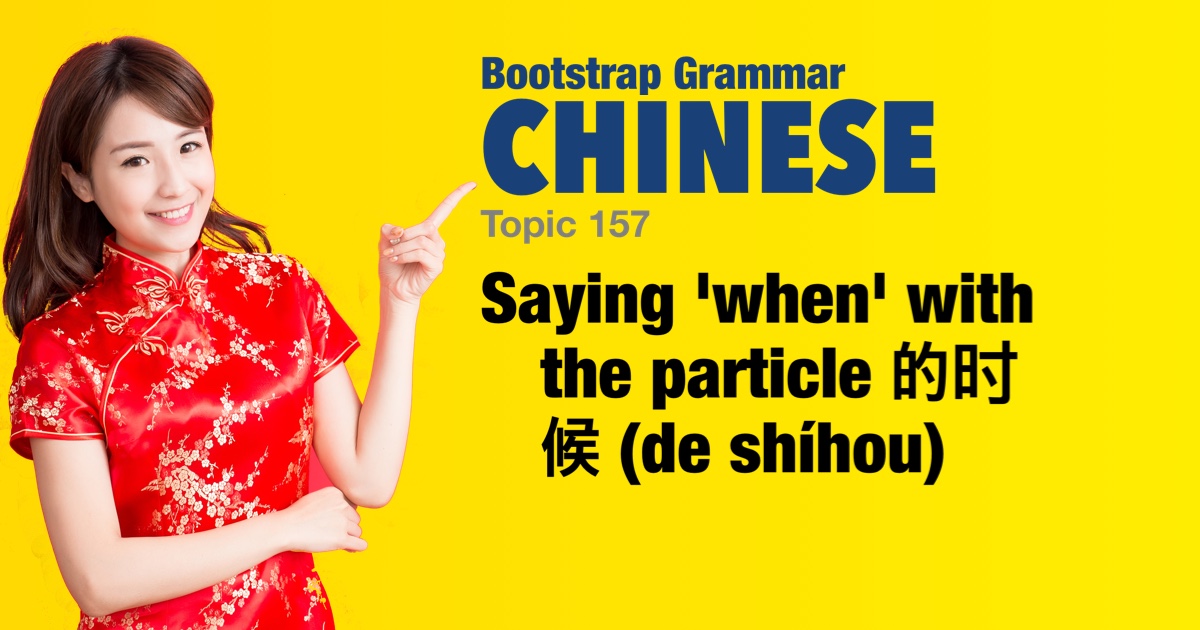Chinese grammar - Saying 'when' with the particle 的时候 (de shíhou) |
|||
|
|||
The phrase 的时候 (de shíhou) is used to indicate 'when' something happens and links to a subsequent clause. It can be used to describe the time or context in which an action takes place and can be used for past, present, and future actions. |
| Examples: | |
|
我吃饭的时候,妈妈打电话来。
wǒ chīfàn deshíhou,#māma dǎ diànhuà lái. When I was eating, my mom called.
|
|
|
他上课的时候,不喜欢说话。
tā shàngkè deshíhou,#bù xǐhuān shuōhuà. When he is in class, he doesn't like to talk.
|
|
|
我们旅行的时候,遇到了朋友。
wǒmen lǚxíng deshíhou,#yùdào le péngyǒu. When we were traveling, we met a friend.
|
|
|
你离开的时候,请关灯。
nǐ líkāi deshíhou,#qǐng guāndēng. When you leave, please turn off the light.
|
|
|
她洗澡的时候,喜欢唱歌。
tā xǐzǎo deshíhou,#xǐhuān chànggē. When she takes a shower, she likes to sing.
|
|
|
我做作业的时候,需要安静。
wǒ zuò zuòyè deshíhou,#xūyào ānjìng. When I do homework, I need quiet.
|
|
|
他回家的时候,买了晚餐。
tā huíjiā deshíhou,#mǎi le wǎncān. When he went home, he bought dinner.
|
|
|
他们比赛的时候,我们在看电视。
tāmen bǐsài deshíhou,#wǒmen zài kàn diànshì. When they were competing, we were watching TV.
|
|
|
我开车的时候,不接电话。
wǒ kāichē deshíhou,#bù jiē diànhuà. When I drive, I don't answer the phone.
|
|
|
他来的时候,天已经黑了。
tā lái deshíhou,#tiān yǐjīng hēi le. When he came, it was already dark.
|
|
|
我运动的时候,感觉很好。
wǒ yùndòng deshíhou,#gǎnjué hěn hǎo. When I exercise, I feel good.
|
|
|
她难过的时候,喜欢听音乐。
tā nánguò deshíhou,#xǐhuān tīng yīnyuè. When she is sad, she likes to listen to music.
|
|
|
我工作的时候,不喜欢被打扰。
wǒ gōngzuò deshíhou,#bù xǐhuān bèi dárǎo. When I work, I don't like to be disturbed.
|
|
|
他放假的时候,去了海边。
tā fàngjià deshíhou,#qù le hǎibiān. When he was on vacation, he went to the beach.
|
|
|
我们吃饭的时候,聊了很多事情。
wǒmen chīfàn deshíhou,#liáo le hěnduō shìqing. When we ate, we talked about many things.
|
|
 |
|


 Indicates the action of eating when the call happened
Indicates the action of eating when the call happened
